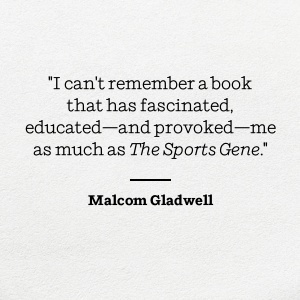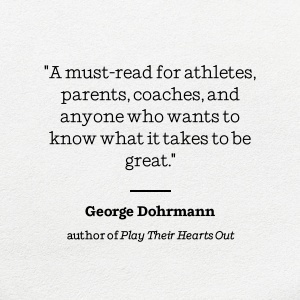Customer Services
Copyright © 2025 Desertcart Holdings Limited
Desert Online General Trading LLC
Dubai, United Arab Emirates


Full description not available



B**K
The Science Behind Elite Athletic Performance
The Sports Gene: Inside the Science of Extraordinary Athletic Performance by David Epstein"The Sports Gene" is an enjoyable book that shares the latest of modern genetic research as it relates to elite athleticism. In the never-ending quest to settle the debate of nature versus nature, David Epstein takes the readers on a journey into sports and tries to answer how much does each contribute. This fascinating 352-page book includes the following sixteen chapters: 1. Beat by an Underhand Girl: The Gene-Free Model of Expertise, 2. A Tale of Two High Jumpers: (Or: 10,000 Hours Plus or Minus 10,000 Hours), 3. Major League Vision and the Greatest Child Athlete Sample Ever: The Hardware and Software Paradigm, 4. Why Men Have Nipples, 5. The Talent of Trainability, 6. Superbaby, Bully Whippets, and the Trainability of Muscle, 7. The Big Bang of Body Types, 8. The Vitruvian NBA Player, 9. We Are All Black (Sort Of): Race and Genetic Diversity, 10. The Warrior-Slave Theory of Jamaican Sprinting, 11. Malaria and Muscle Fibers, 12. Can Every Kalenjin Run?, 13. The World's Greatest Accidental (Altitudinous) Talent Sieve, 14. Sled Dogs, Ultrarunners, and Couch Potato Genes, 15. The Heartbreak Gene: Death, Injury, and Pain on the Field, and 16 The Gold Medal Mutation.Positives:1. Well-written, well-researched book. Epstein is very engaging and keeps the science at a very accessible level.2. Fascinating topic that sports fans will enjoy. A look at elite athleticism through the eyes of science. Sports elites. I'm there!3. Epstein does a fantastic job of skillfully handling the very sensitive topic of race and genetics. Any minor miscue and it would have derailed the book but Epstein never lets that happen and should be commended for his utmost care.4. There are very few books on this interesting topic and this one covers multiple sports. And behind it all is the quest to find what's behind elite athleticism, "The question for scientists is: What accounts for that variance, practice, genes, or something else?"5. You are guaranteed to learn something new. As an avid sports fan and reader, I didn't expect to learn too many new facts but I am always humbled and pleasantly surprised when I do.6. The importance of experience in athletics. "Studies that track the eye movements of experienced performers, whether chess players, pianists, surgeons, or athletes, have found that as experts gain experience they are quicker to sift through visual information and separate the wheat from the chaff."7. Golfers will pick up a valuable scientific tip...I'm not going to spoil it here.8. The 10,000 hours rule in perspective. "Studies of athletes have tended to find that the top competitors require far less than 10,000 hours of deliberate practice to reach elite status. According to the scientific literature, the average sport-specific practice hours to reach the international levels in basketball, field hockey, and wrestling are closer to 4,000, 4,000, and 6,000, respectively."9. Understanding the importance behind visual acuity and its importance in sports like baseball. "Coincidentally, or perhaps not, twenty-nine often is the age at which visual acuity starts to deteriorate and the age when hitters, as a group, begin to decline."10. Important lessons shared, "To this day," Woods said in 2000, "my dad has never asked me to go play golf. I ask him. It's the child's desire to play that matters, not the parent's desire to have the child play."11. Addressing the differences in gender. "Much of sexual differentiation comes down to a single gene on the Y chromosome: the SRY gene, or "sex determining region Y" gene. Insofar as there is an "athleticism gene," the SRY gene is it." Great stuff!12. So who was the greatest high-school athlete of all time according to ESPN? Find out.13. The impact of the Human Genome Project as it relates to sports. The naturally fit six...14. The science behind muscle growth. "Something that myostatin does signals muscles to cease growing. They had discovered the genetic version of a muscle stop sign. In the absence of myostatin, muscle growth explodes." A lot of good information here.15. Discusses physical traits by sport that give the athletes innate advantages over the competition. "The height of a sprinter is often critical to his best event. The world's top competitors in the 60-meter sprint are almost always shorter than those in the 100-, 200-, and 400-meter sprints, because shorter legs and lower mass are advantageous for acceleration."16. A cool look at the NBA. My favorite team of all time, the 95-96 Chicago Bulls (Jordan, Pippen and Rodman). Some eye-opening facts concerning wingspan.17. Scientific observations, "Low-latitude Africans and Australian Aborigines had the proportionally longest legs and shortest torsos. So this is not strictly about ethnicity so much as geography."18. Race and genetic diversity. "Kidd's work, along with that of other geneticists, archaeologists, and paleontologists, supports the "recent African origin" model--that essentially every modern human outside of Africa can trace his or her ancestry to a single population that resided in sub-Saharan East Africa as recently as ninety thousand years ago." Honestly, where would we be without understanding the grand theory of evolution? An excellent chapter, worth the price of the book.19. Mind-blowing facts, " In an example particularly relevant to sports, about 10 percent of people with European ancestry have two copies of a gene variant that allows them to dope with impunity." Wow!20. An interesting look at Jamaican sprinting and Kenyan long-term running. What's behind the success? "Consider this: seventeen American men in history have run a marathon faster than 2:10 (or a 4:58 per mile pace); thirty-two Kalenjin men did it just in October 2011." Say what?21. The honest limitations of the young science of genetics, "Just as it is tough to find genes for height--even though we know they exist--it is extraordinarily difficult to pin down genes for even one physiological factor involved in running, let alone all of them."22. Is motivation genetic? Interesting.23. Genetic diseases. "According to statistics that Maron has compiled, at least one high school, college, or pro athlete with hypertrophic cardiomyopathy (HCM) will drop dead somewhere in the United States every other week."24. An excellent epilogue on the perfect athlete, "In reality, any case for sports expertise that leans entirely on either nature or nurture is a straw-man argument."25. Notes and selected citations included.Negatives:1. Football is the most popular sports in America bar none but wasn't really given as much paper as I was hoping for; sure you get some stories about Jerome Bettis, Herschel Walker, head injuries and weight lifting...but not the treatment a sport of its magnitude would warrant.2. The science is very basic and done so to reach a larger audience. Links or an appendix would have given curious readers more to immediately munch on.3. At no fault of the author, the science of genetics is still too young to be able to answer the most demanding questions to a satisfactory level.4. No formal separate bibliography...you have to surf through the notes.5. Few links.In summary, the perfect summer book. This was a page-turner of a book that provides us a glimpse into elite athleticism through the eyes of science. David Epstein provides sports enthusiasts with a scientific treat. One thing is perfectly clear...genetics is very complex and we are in its infancy. That being said, it's fascinating science and its increased understanding will continue to be applied to the world of sports. Epstein provides readers with an excellent appetizer of things to come; if you are interested in how genetics is being applied to extraordinary athletic performance, I highly recommend this book!Recommendations: "Outliers: The Story of Success" by Malcom Gladwell, "Drive: The Surprising Truth About What Motivates Us" by Daniel H. Pink, "The Power of Habit: Why We Do What We Do in Life and Business" by Charles Duhigg, "Subliminal: How Your Unconscious Mind Rules Your Behavior (Vintage)" by Leonard Mlodinow, "Running Science" by Owen Anderson, "Your Inner Fish: A Journey into the 3.5-Billion-Year History of the Human Body" by Neil Shubin, "The Making of the Fittest: DNA and the Ultimate Forensic Record of Evolution" by Sean B. Carroll, "The 10,000 Year Explosion: How Civilization Accelerated Human Evolution" by Gregory Cochran and Henry Harpending, "Relics of Eden: The Powerful Evidence of Evolution in Human DNA" by Daniel J. Fairbanks, "Why Darwin Matters: The Case Against Intelligent Design" by Michael Shermer, "Only a Theory" by Kenneth R. Miller, "The Greatest Show on Earth" by Richard Dawkins and, "Why Evolution Is True" by Jerry A. Coyne.
T**O
great read
Practice makes perfect, Practice makes perfect, Practice makes perfect .....this is basically what this book is all about. Apart from some naturally gifted people, the rest of us have to practice to excel to our abilities in our respective sports. That magical target number seems to be 10,000 hours of practice. What is very interesting is that blacks have all the right genetic attributes to take part and excel in virtually all the sports available in the world but because of the high cost of entry into some of these sports coupled with the expense of 10,000 hour average training requirements and a history of being exploited, you therefore only see blacks excel in sports where the entry barriers are low such as basketball, baseball, football, running, cricket and soccer. Blacks are more than capable to win Olympic medals in swimming, skiing, speed skating and all the other white dominated sports.I just finished watching the White Winter Olympics in Sochi and was totally disappointed to not see more athletes of color. Thanks to the underfunded Jamaicans for giving the rest of the colored world some exposure. The former Colonial power - the Dutch - speed skaters were astounding and their performance was similar to the East Germans in the 80s when they dominated everything while on steroids. The Poor USA team were blaming everything from the bad food in Sochi to their multi million dollar speed less suits for their poor showing, Shauni Davis is too old and past his prime to be taking part in such a demanding sport that requires peak fitness and recovery found in 20 something year olds. But thanks to the brother for adding some color and contrast to the white Olympics. What bothers me is that there are not enough Indians, Pakistanis, Afghanis and Nepalis in the Winter Olympics considering these countries have snow and very aggressive and athletic people.The author described a plethora of genetic and medical testing done on various ethnic groups around the world but he did fail to include the effects of penis size on athletic performance in males although he did mention something about women with testes. I do believe this was a serious omission ...sarcasm.I would recommended this book, especially if you are interested to know how people were exploited and marginalized during colonial times and who only now are emerging to take their rightful places in society despite continued subtle exploitation.
Trustpilot
3 weeks ago
3 days ago